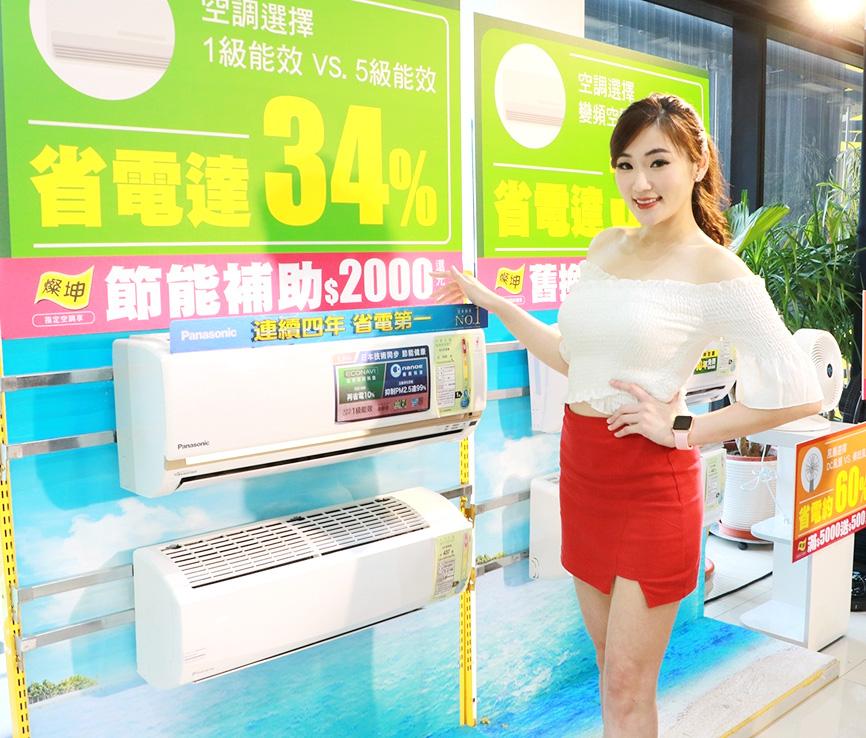A proposal to extend tax rebates on energy-saving home appliances for another two years has been approved by the Cabinet and is to be submitted to the legislature for review, Executive Yuan spokesman Lo Ping-cheng (羅秉成) said yesterday.
If lawmakers approve the amendments to the Commodity Tax Act (貨物稅條例), the incentives would continue until June 14, 2023, allowing a rebate of up to NT$2,000 (US$70.09) on new refrigerators, air-conditioners and dehumidifiers if they meet energy efficiency standards, Lo told reporters.
The Ministry of Finance, which submitted the proposal to the Cabinet for the incentives to be extended, said that there are still approximately 12.42 million air-conditioners and refrigerators more than 10 years old in homes in Taiwan — about 42.72 percent of those in domestic use.

Photo: Wu Pei-hua, Taipei Times
The continuation of the incentives, which were introduced in June 2019, would encourage more people to buy energy-efficient appliances, the ministry said.
Since June 2019, the incentive program has helped to save about 400 million kilowatt-hours of electricity per year, reducing energy bills and cutting carbon emissions by 220,000 tonnes, Lo said, citing data that Premier Su Tseng-chang (蘇貞昌) presented at a Cabinet meeting earlier in the day.
If the incentives are extended, refunds can be claimed by people who buy appliances that reach the “level 1” or “level 2” energy efficiency standards specified in a Bureau of Energy rating system.

BYPASSING CHINA TARIFFS: In the first five months of this year, Foxconn sent US$4.4bn of iPhones to the US from India, compared with US$3.7bn in the whole of last year Nearly all the iPhones exported by Foxconn Technology Group (富士康科技集團) from India went to the US between March and last month, customs data showed, far above last year’s average of 50 percent and a clear sign of Apple Inc’s efforts to bypass high US tariffs imposed on China. The numbers, being reported by Reuters for the first time, show that Apple has realigned its India exports to almost exclusively serve the US market, when previously the devices were more widely distributed to nations including the Netherlands and the Czech Republic. During March to last month, Foxconn, known as Hon Hai Precision Industry

Taiwan Semiconductor Manufacturing Co (TSMC, 台積電) and the University of Tokyo (UTokyo) yesterday announced the launch of the TSMC-UTokyo Lab to promote advanced semiconductor research, education and talent development. The lab is TSMC’s first laboratory collaboration with a university outside Taiwan, the company said in a statement. The lab would leverage “the extensive knowledge, experience, and creativity” of both institutions, the company said. It is located in the Asano Section of UTokyo’s Hongo, Tokyo, campus and would be managed by UTokyo faculty, guided by directors from UTokyo and TSMC, the company said. TSMC began working with UTokyo in 2019, resulting in 21 research projects,

Ashton Hall’s morning routine involves dunking his head in iced Saratoga Spring Water. For the company that sells the bottled water — Hall’s brand of choice for drinking, brushing his teeth and submerging himself — that is fantastic news. “We’re so thankful to this incredible fitness influencer called Ashton Hall,” Saratoga owner Primo Brands Corp’s CEO Robbert Rietbroek said on an earnings call after Hall’s morning routine video went viral. “He really helped put our brand on the map.” Primo Brands, which was not affiliated with Hall when he made his video, is among the increasing number of companies benefiting from influencer

Quanta Computer Inc (廣達) chairman Barry Lam (林百里) yesterday expressed a downbeat view about the prospects of humanoid robots, given high manufacturing costs and a lack of target customers. Despite rising demand and high expectations for humanoid robots, high research-and-development costs and uncertain profitability remain major concerns, Lam told reporters following the company’s annual shareholders’ meeting in Taoyuan. “Since it seems a bit unworthy to use such high-cost robots to do household chores, I believe robots designed for specific purposes would be more valuable and present a better business opportunity,” Lam said Instead of investing in humanoid robots, Quanta has opted to invest